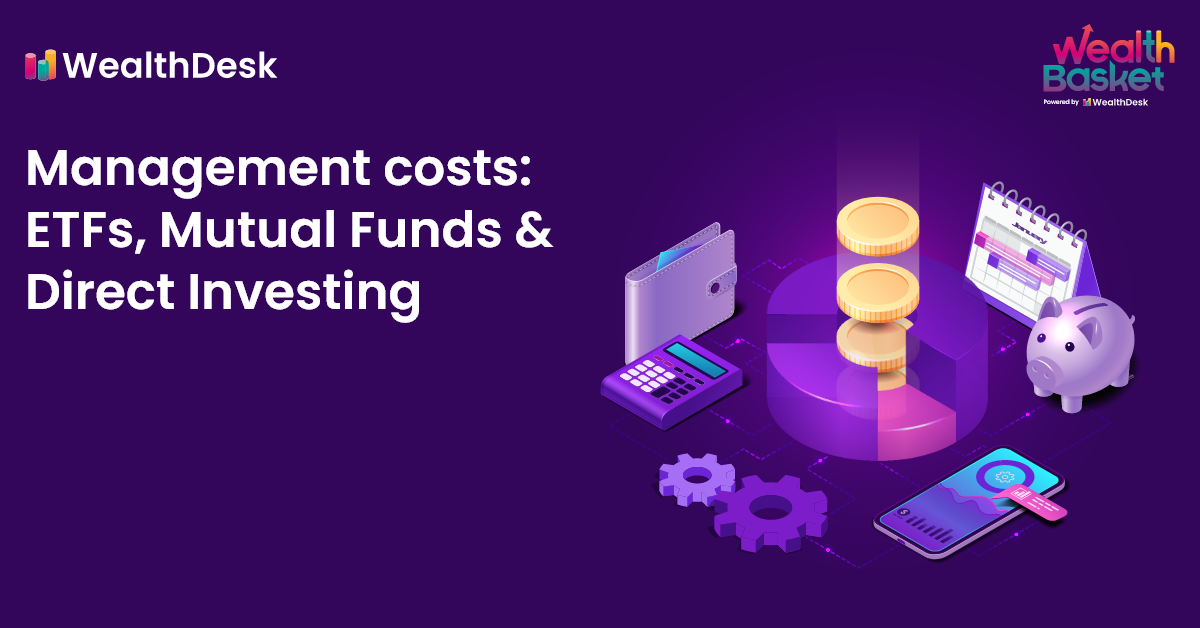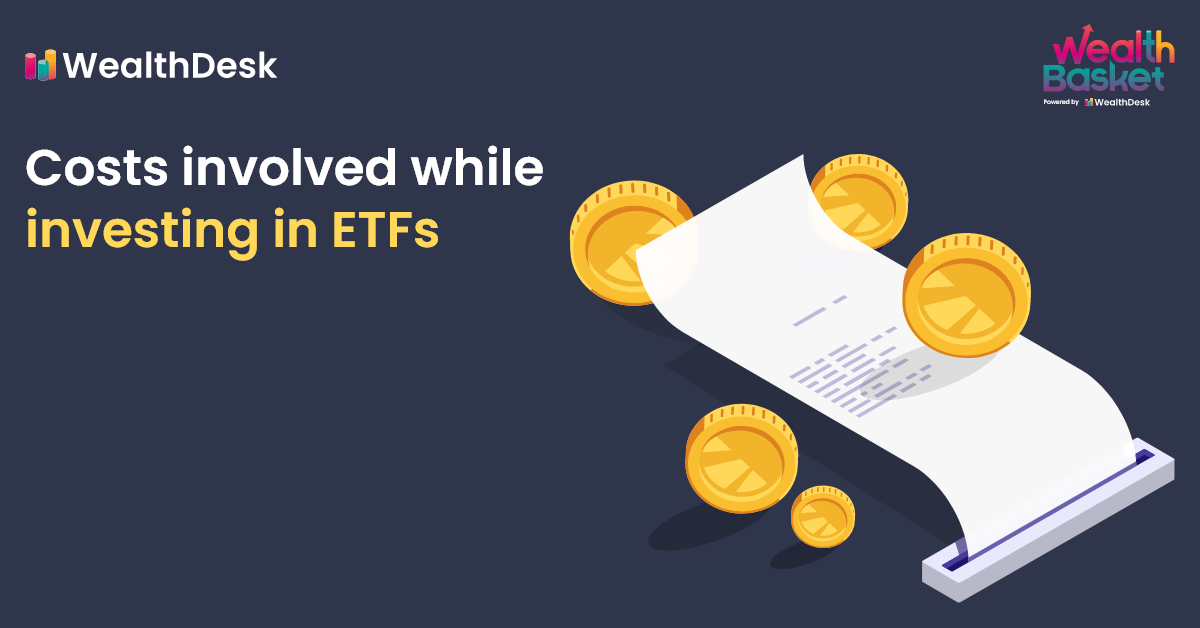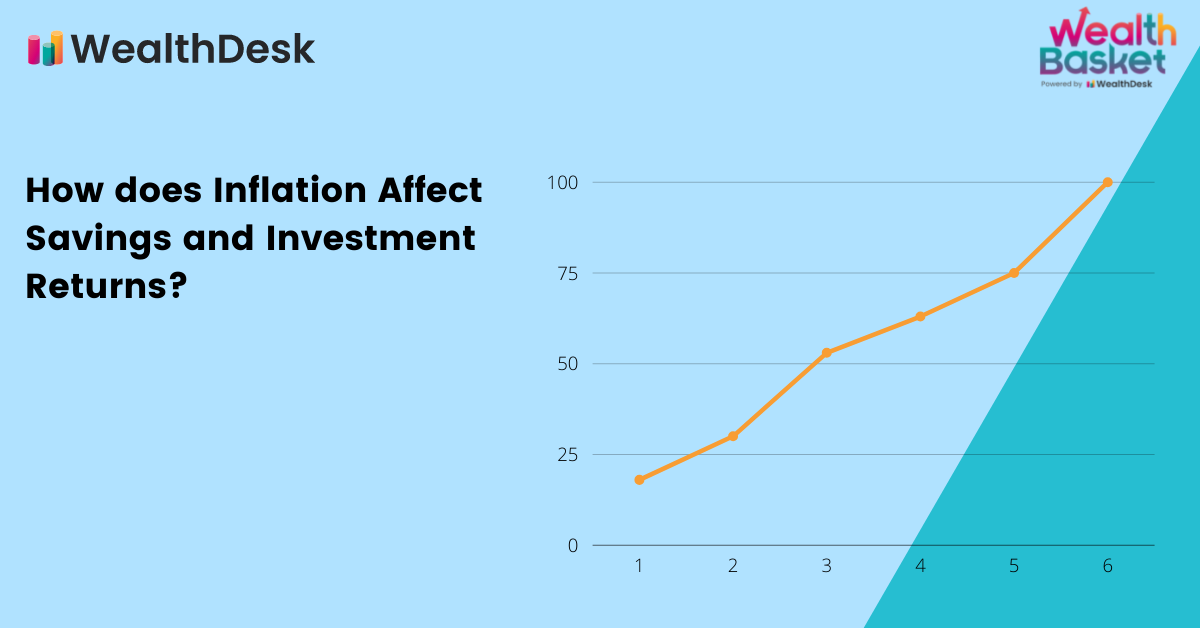Investment managers charge management fees for managing an investment fund, like mutual funds or exchange-traded funds, often marked as the expense ratio. An expense ratio is the percentage of costs incurred by a manager to the total value of investments managed. Expense ratios range from 0.5% to 1.0% for actively managed funds as opposed to 0.2% expense ratios for passively managed funds.
Investors who are directly buying and managing securities are responsible for managing the portfolio and accounting for all costs, risks, and opportunities.
Whether an investor chooses to invest directly or indirectly (through mutual funds or ETFs), both incur management costs.
Here we look at the various management costs associated with ETFs and mutual funds and compare them with the cost of managing your own portfolio of direct investments.
What is included in the management fee of investment funds?
Management costs include the salary of the fund manager, the salaries of the staff, research costs, travel and accommodation costs incurred on field visits by analysts and administrative fees, among other things. Basically, all the expenses incurred in running the investment fund. Typically, these costs are clubbed together and represented by the expense ratio.
Here, assets under management refer to the total market value of investments that the fund managing company handles.
How can we calculate the management fees?
We can calculate the fund’s management fee by multiplying our investment by the expense ratio.
For example, if you invest ₹2,00,000 into ABC mutual fund which has an expense ratio of 2% then you would have to pay = ₹2,00,000 X 2/100 = ₹4,000.
Typically, the following fees should be included under expense ratios:
- Research and analysis
When you invest in a mutual fund or ETF, you avail yourself of the services of research, analysis and strategic positioning of a portfolio. The fund manager is responsible for studying the market and economic indicators. Based on this research, they would conduct analysis for stock picking as per the fund’s investment philosophy. These services come at a price.
- Administrative costs
The costs of maintaining a company’s daily operations and administering its business are called administrative costs. Any costs that are not incurred to select or procure the assets are included under this. For example, they include rent, legal costs, etc. These are costs incurred by the organisation as a whole and not by any individual department.
- Marketing expenses
The expense of promoting and advertising a fund comes under marketing expenses. They are sometimes called 12b-1 fees. Including marketing expenses under the expense ratio is considered as disguised commission. Marketing expenses are known to vary. 98% of these fees are paid to the broker for as long as the investor holds the fund. These costs may also be mentioned independently. Funds that don’t charge marketing fees would be cheaper than funds that do.
- GST
Goods and Services Tax of 18% is applicable on any services provided by the fund, such as management.
Important Considerations
Actively managed funds that try to outperform their benchmark index (e.g. SENSEX, Nifty, Nifty Bank, etc.) will tend to have a higher expense ratio. This is because the management fees are higher for actively managed funds. Therefore, they need to conduct research and analysis for delivering higher returns.
On the other hand, passively managed funds try to replicate the returns of an index by investing in the securities that make up an index with the exact weightage. Therefore, there is no need for extensive research and analysis.
It should also be noted that mutual funds or ETFs may not have a cost edge over the other just based on the structure. The management costs would solely depend on whether the fund is managed actively or passively.
What is the cost of managing a portfolio of direct investments?
When you invest directly into securities, you are solely responsible for the following tasks:
- Studying the market and economic indicators
- Searching for various investment opportunities
- Analysing these opportunities from a risk, return and cost perspective
- Keep your financial goals in mind and sift through these opportunities
- Understand the tax implications of assets you buy
- Make the transactions for shifting the focus of your portfolio when needed
- Reassess your strategy periodically
At first glance, it looks like an investor can avoid a lot of costs by investing independently. But, they take on the fund management activities previously carried out by a fund manager. The time and energy saved by paying a fee to the fund manager will now be spent on carrying out the tasks mentioned in the list above.
An investor should reflect whether they can afford to spend time and energy managing their portfolio. They should also consider how they compare to fund managers backed by teams of analysts.
Conclusion
To summarize, we have learned that the cost of managing a fund would be passed on to the investors in the form of expense ratios or in some other form. The investors can opt for direct investing, however, this has its own share of challenges. It becomes the responsibility of the investor to conduct research and analysis for their portfolio.
It is better to ask whether a fund is managed actively
or passively, rather than asking whether it is an ETF or
mutual fund.
On
WealthDesk, one can
invest in stock and ETF portfolios curated and managed
by SEBI registered
WealthBasket managers. The investors have direct ownership of the underlying
stocks and ETFs and can invest without a lock-in. The
rebalancing process is also simplified by one-click
rebalancing.
FAQs
ETFs may not have an edge cost-wise over mutual funds solely on the basis of their structure. It is a misconception that all ETFs have lower costs. While this may be true for index ETFs that are passively managed, actively managed ETFs will have the management fees to match. It is better to ask whether the fund is actively managed or passively managed.
ETFs have higher liquidity than mutual funds as they are traded freely on the exchanges during market hours. Mutual funds on the other hand can only be bought or sold from the fund managing firm after market hours.
Yes, investors do not require a Demat account for investing in mutual funds. On the other hand, a Demat account is required for investing in stocks or ETFs.


















